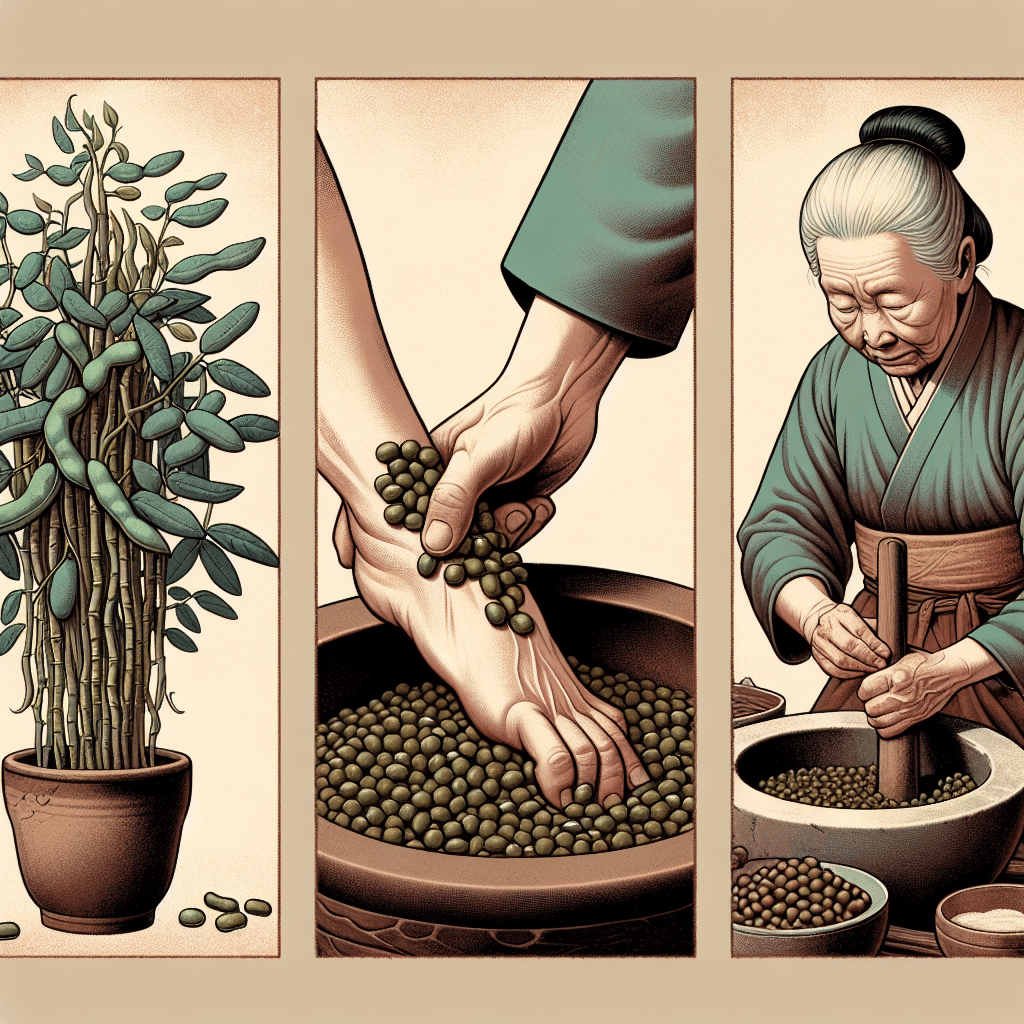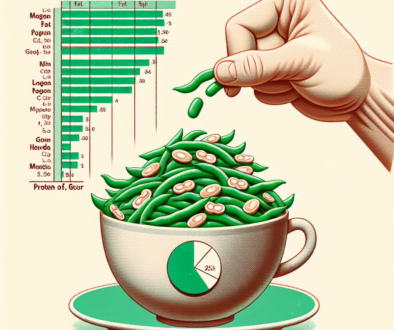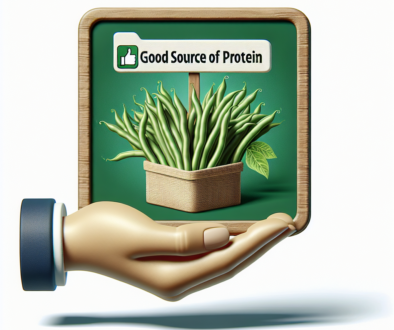Mung Beans in Traditional Medicine
-
Table of Contents
- Mung Beans in Traditional Medicine: A Comprehensive Guide
- Historical Significance of Mung Beans in Medicine
- Nutritional Profile of Mung Beans
- Therapeutic Uses of Mung Beans in Traditional Medicine
- Scientific Evidence Supporting the Medicinal Benefits of Mung Beans
- Case Studies and Anecdotal Evidence
- Preparation and Usage in Traditional Remedies
- Considerations and Potential Side Effects
- Conclusion: Mung Beans as a Multifaceted Traditional Remedy
- Discover ETprotein’s High-Quality Mung Bean Protein Products
Mung Beans in Traditional Medicine: A Comprehensive Guide

Mung beans, a staple in Asian cuisine, have been used for centuries not only as a food source but also as a component in traditional medicine. These small, green legumes are packed with nutrients and have been attributed with various health benefits, making them a valuable ingredient in the holistic approach to wellness. This article delves into the role of mung beans in traditional medicine, exploring their uses, benefits, and the scientific evidence supporting their medicinal properties.
Historical Significance of Mung Beans in Medicine
The use of mung beans in traditional medicine dates back thousands of years, with their origins in the Indian subcontinent. They have been a part of Ayurvedic medicine, one of the world’s oldest holistic healing systems, which was developed more than 3,000 years ago in India. According to Ayurveda, mung beans are considered ‘tridoshic,’ which means they can balance all three doshas (body types) – Vata, Pitta, and Kapha – and help maintain overall health.
In traditional Chinese medicine (TCM), mung beans are known for their cooling properties. They are believed to expel toxins from the body, reduce heat and inflammation, and provide a balance in the body’s yin and yang. Mung beans are also used in various other Asian medicinal practices, including those in Vietnam, Korea, and Japan, where they are valued for their health-promoting qualities.
Nutritional Profile of Mung Beans
Mung beans are rich in vitamins and minerals, protein, dietary fiber, and antioxidants. Here’s a breakdown of their nutritional content:
- Protein: Mung beans are a good source of plant-based protein, which is essential for muscle repair and growth.
- Fiber: High in dietary fiber, mung beans can aid digestion and promote a feeling of fullness.
- Vitamins: They contain B-vitamins, particularly folate, which is important for DNA synthesis and preventing neural tube defects in pregnancy.
- Minerals: Mung beans are rich in potassium, magnesium, iron, and zinc, contributing to various bodily functions such as blood pressure regulation and immune system support.
- Antioxidants: These beans have potent antioxidants like vitexin and isovitexin, which can help combat oxidative stress and reduce the risk of chronic diseases.
Therapeutic Uses of Mung Beans in Traditional Medicine
In traditional medicine, mung beans have been used to treat a variety of ailments. Some of the therapeutic uses include:
- Detoxification: Mung beans are believed to help detoxify the body and cleanse the liver.
- Heatstroke: Due to their cooling effect, they are often recommended for relieving heatstroke and reducing body temperature.
- High Blood Pressure: The potassium content in mung beans can help regulate blood pressure levels.
- Diabetes Management: Their low glycemic index and high fiber content make mung beans beneficial for blood sugar control.
- Digestive Health: Mung beans can aid in digestion and prevent constipation due to their fiber content.
- Weight Loss: As a low-calorie food that provides satiety, mung beans can be a helpful addition to weight loss diets.
Scientific Evidence Supporting the Medicinal Benefits of Mung Beans
Modern research has begun to validate many of the traditional claims about the health benefits of mung beans. Studies have shown that mung beans possess anti-inflammatory, antimicrobial, antidiabetic, and antihypertensive properties. They have also been found to have potential in cancer prevention and treatment due to their antioxidant content.
For instance, a study published in the “Journal of Agricultural and Food Chemistry” found that peptides derived from mung bean protein showed significant antioxidant and free radical scavenging activities. Another study in the “Nutrition Journal” reported that mung bean extract could improve insulin resistance and regulate lipid metabolism, which is beneficial for managing diabetes and obesity.
Case Studies and Anecdotal Evidence
There are numerous anecdotal reports and a few case studies that illustrate the effectiveness of mung beans in treating various health conditions. For example, in several Asian countries, mung bean soup is commonly consumed during the summer months to prevent heatstroke and maintain hydration. Additionally, mung bean-based remedies have been reported to help alleviate acne and other skin conditions due to their anti-inflammatory properties.
Preparation and Usage in Traditional Remedies
Mung beans can be used in various forms – whole, split, or ground into flour – and incorporated into different traditional remedies. Here are some common preparations:
- Mung Bean Soup: A simple soup made with mung beans and water, often flavored with spices and herbs.
- Mung Bean Porridge: A comforting dish made by cooking mung beans with rice and additional ingredients for flavor.
- Mung Bean Paste: Ground mung beans are used as a base for medicinal pastes applied topically to treat skin conditions.
- Mung Bean Tea: Dried mung beans are steeped in hot water to make a detoxifying tea.
Considerations and Potential Side Effects
While mung beans are generally considered safe for most people, there are some considerations to keep in mind:
- Individuals with digestive issues should introduce mung beans gradually to avoid gas and bloating.
- People with a history of kidney stones may need to limit their intake due to the oxalate content in mung beans.
- As with any dietary change, it’s important to consult with a healthcare provider before using mung beans for medicinal purposes, especially for those with underlying health conditions or those taking medications.
Conclusion: Mung Beans as a Multifaceted Traditional Remedy
Mung beans have played a significant role in traditional medicine across various cultures. Their nutritional profile and therapeutic properties make them a valuable addition to a health-conscious diet. With modern science beginning to support the benefits that traditional medicine has long observed, mung beans are gaining recognition as a superfood with medicinal qualities.
The key takeaways from this comprehensive guide are the historical significance of mung beans in medicine, their rich nutritional content, the wide range of health benefits they offer, and the scientific evidence that backs up their use in traditional healing practices. Whether consumed as part of a daily diet or used in specific remedies, mung beans can contribute to overall health and well-being.
Discover ETprotein’s High-Quality Mung Bean Protein Products
If you’re looking to incorporate the benefits of mung beans into your diet, ETprotein offers a range of high-quality mung bean protein products. Their mung bean protein is organic, non-GMO, and allergen-free, making it an excellent choice for those seeking plant-based protein options. ETprotein’s products are ideal for use in nutraceuticals, pharmaceuticals, cosmeceuticals, veterinary products, as well as food and beverage items.
With ETprotein’s commitment to quality and customer satisfaction, you can trust that you’re getting the best mung bean protein on the market. Whether you’re a distributor, trader, or manufacturer, ETprotein can meet your needs with their extensive product range and tailor-made solutions.
About ETprotein:
ETprotein, a reputable protein Chinese factory manufacturer and supplier, is renowned for producing, stocking, exporting, and delivering the highest quality organic bulk vegan protein and plant proteins. They include Organic rice protein, clear rice protein, pea protein, clear pea protein, pumpkin seed protein, sunflower seed protein, mung bean protein, etc. Their offerings, characterized by a neutral taste, non-GMO, allergen-free attributes, cater to a diverse range of industries. They serve nutraceutical, pharmaceutical, cosmeceutical, veterinary, as well as food and beverage finished product distributors, traders, and manufacturers across Europe, USA, Canada, Australia, Thailand, Japan, Korea, Brazil, and Chile, among others.
ETprotein specialization includes exporting and delivering tailor-made protein powder and finished nutritional supplements. Their extensive product range covers sectors like Food and Beverage, Sports Nutrition, Weight Management, Dietary Supplements, Health and Wellness Products, and Infant Formula, ensuring comprehensive solutions to meet all your protein needs.
As a trusted company by leading global food and beverage brands and Fortune 500 companies, ETprotein reinforces China’s reputation in the global arena. For more information or to sample their products, please contact them and email sales(at)ETprotein.com today.














